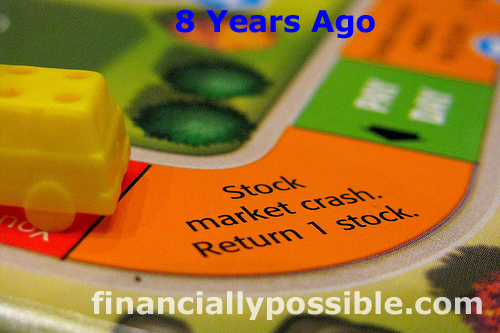
Eight years ago today (October, 14th), my mother shared the following email with me:
(If anyone knows the origin of the contents below, please let me know. I’d love to give credit to the source. It’s very creative writing.)
NEW STOCK MARKET TERMS
CEO — Chief Embezzlement Officer
CFO — Corporate Fraud Officer
BULL MARKET — A random market movement causing an investor to mistake himself for a financial genius
BEAR MARKET — A 6-18 month period when the kids get no allowance, the wife gets no jewelry, and the husband gets no sex
VALUE INVESTING — The art of buying low and selling lower
P/E RATIO — The percentage of investors wetting their pants as the market keeps crashing
BROKER — What my broker has made me
STANDARD & POOR — Your life in a nutshell
STOCK ANALYST — Idiot who just downgraded your stock
STOCK SPLIT — When your ex-wife and her lawyer split your assets equally between themselves
FINANCIAL PLANNER — A guy whose phone has been disconnected
MARKET CORRECTION — The day after you buy stocks
CASH FLOW — The movement your money makes as it disappears down the toilet
YAHOO — What you yell after selling it to some poor sucker for $240 per share
WINDOWS — What you jump out of when you’re the sucker who bought Yahoo @ $240 per share
INSTITUTIONAL INVESTOR — Past year investor who’s now locked up in a nuthouse
PROFIT — An archaic word no longer in use
For those of us who remember what was going on with the world stock markets at the time, like myself, you probably find the contents above quite amusing. At the same time, I also sympathized with the pain and uncertainty many other investors were feeling as we watched the stock markets going lower and lower. However, despite the emotional turmoil that was happening across the globe, I kept buying anyway. In fact, I was buying even more aggressively. As the markets continued to fall, the terms for “stock analyst” and “market correction” were two of the most amusing and painful in that list for me. Many of my new purchases fell the day right after the orders were executed. Even more painful, many analysts continued to downgrade my stocks as the share prices were falling. As I think of stock analysts in general, an image comes to my mind of Blinkin as a blind lookout in the Mel Brooks parody film Robin Hood Men in Tights.
The market didn’t hit bottom until November 20, 2008 and then made an even lower low on March 9, 2009. In hindsight, I am very happy with the decisions I made during those trying times.
Today, exactly eight years later, we live in very different times. The markets have recovered and climbed more. Nowadays, I often feel disappointed because there aren’t as many great companies to buy at prices I like. I am sharing this list today because the market runs in cycles and someday in the future this list will once again resonate with many. I am also sharing it to urge you, my readers, to process and reevaluate your feelings again and again when the markets are high and when the markets are low. The pains and turmoils from those market low days still weigh on the minds of many, but with the passing of time those emotions also become less salient. Lastly, I am also sharing it because I’m concerned. If there’s any truth to what was suggested in the BusinessInsider article I linked to above, we may lose an entire generation of investors. And I don’t want anyone of us to work longer than we have to thereby robbing ourselves of good health and precious time to spend with our families and loved ones.
Do you remember how you felt on October 14, 2008? I’d love to hear from you in as much detail as you care to share.

Congrats on having the foresight to continue to buy. I remember wishing I had more money to purchase stock but was poor trying to keep up with the mortgage payments I had. Good news is I paid off my mortgage and can buy more stock. Bad news is the stock prices are way higher. Oh well. Thanks for sharing!!!
Hi Mustard Seed Money,
Congrats on being mortgage free! I also once had a mortgage and bought a house that was bigger than I needed (but not too terribly expensive). I paid off the mortgage too aggressively and in hindsight wish I had invested more into stocks in my early 20s.